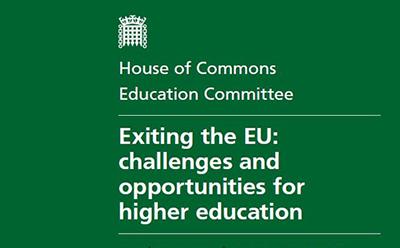
Highlights from this month's Higher Education Digest include:
- General Election
- Higher Education and Research Act 2017
- HoC Education Committee Report on Brexit and Higher Education
- Industrial Strategy: Science and STEM skills

Highlights from this month's Higher Education Digest include:
1. With a surprise General Election announced for 8 June, HE representative bodies have been beginning to look at the issues they will want to raise with politicians of all parties in the coming weeks. These include making a success of Brexit, ensuring an immigration system to attract staff and students from across the world, ensuring funding for both research and teaching and supporting universities to deliver economic growth as part of the Industrial Strategy.
2. The combination of first the Easter Recess and then the announcement of a General Election for 8 June has meant that a number of potential Government announcements of relevance to universities have been postponed, including a potential White Paper on schools (with a recommendation that Universities should sponsor local schools), and the response to the Government’s consultation on the Industrial Strategy.
3. The election had a significant effect on the passage of the Higher Education and Research Bill. This was one of the Bills caught up in a last minute scramble to achieve Royal Assent before Parliament was dissolved. The Bill had been due to go back to the House of Commons to debate a significant number of amendments passed during its passage through the Lords. Following talks between the parties, the Government proposed some amendments which were approved by the Commons on 26 April and the Lords on 27 April, when it also received Royal Assent and became law.
4. The amendments leave the main parts of the Bill intact. These include the creation of the Office for Students (OfS) and UK Research & Innovation (UKRI), clearer paths for new entrants to HE, and the Teaching Excellence Framework (TEF). Two of the most significant amendments from the Lords were overturned (decoupling TEF from tuition fees, and removing international students from immigration figures. The new amendments include:
5. On 21 April, the Government announced that EU students applying for university places in 2018/19 will continue to pay UK fees and remain eligible for financial support for the duration of their courses, even if those courses conclude after the UK has left the EU. This is a similar guarantee to ones given for students starting in 2017/18.
6. The House of Commons Select Committee for Education published a report on 25 April on Brexit and Higher Education. The recommendations from the report include:
7. The 2018 Complete University Guide league tables were published on 26 April. The top five Universities in the ranking are Cambridge, Oxford, St Andrews, LSE and Imperial. The University of Southampton was placed 26th, with four individual subjects rated in the top five nationally (Aeronautical & Manufacturing Engineering, Architecture, Electrical & Electronic Engineering, and Nursing).
8. The Equalities Challenge Unit (ECU) has published a report from the Athena Survey of Science, Engineering and Technology (ASSET) 2016. The survey found that women experienced disadvantage compared to men in levels of professional development and markers of esteem, and that more men than women had been formally promoted to their current posts. Women spent more time on teaching and administrative duties compared with men, who spent more time on research. A significantly larger proportion of women had taken parental leave and career breaks than men, and there were a number of perceived career disadvantages associated with this. A larger percentage of men were encouraged to apply for promotion, compared to women.
9. The House of Commons Science and Technology Committee published a report on 12 April considering two of the ten pillars of the Industrial Strategy – “science, research and innovation” and “developing skills”. On science, research and innovation, the Committee welcomes the additional £2B funding, but advocates a 3% of GDP target for public and private sector investment in R&D. It is broadly supportive of the Industrial Strategy Challenge Fund. On skills, the Committee states that the priority is encouraging understanding of science in pupils from an early age, but it also notes the importance on giving a firm commitment to EU researchers post-Brexit. The Committee is critical that the Industrial Strategy does not discuss and acknowledge the links between the issues it is addressing and Brexit.
10. The UPP Foundation and Student Minds have released a new report on how universities can support student mental health, particularly those living in purpose built student accommodation. The report recommends a joined up approach of referral pathways and crisis policies, and the vital role played by accommodation staff, who need to be properly trained. It also identifies the need for better information and resources for students.
11. The Higher Education Policy Institute (HEPI) published a report on 27 April entitled Whither Teacher Education and Training. The paper reflects on recent policy changes in teacher training and the failure to meet targets for teacher training in the UK. It then makes a number of recommendations, from replacing the bursary system with new one of “forgivable fees”, to improving the supply chain, and treating all routes to qualified or accredited teacher status equally. There are further recommendations on the role of schools, career progression and a stable curriculum and assessment structure.
12. A new What Works? report on supporting students and student retention has been jointly published by the HEA, the Paul Hamlyn Foundation and Action on Access. This builds on a previous report in 2012, and 13 HEIs have participated in the work to help put the earlier findings into practice. The report sets out specific interventions made by the 13 HEIs and the impacts which these have had.
13. Shakira Martin has been elected the new President of the NUS, defeating the previous incumbent, Malia Bouattia.
Gavin Costigan
Director of Public Policy|Southampton
@CostiganGavin